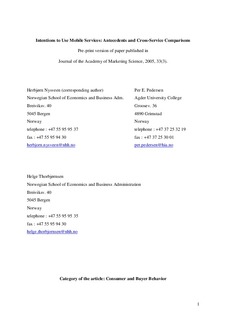Intentions to use mobile services: Antecedents and cross-service comparisons
Journal article
Permanent lenke
http://hdl.handle.net/11250/301483Utgivelsesdato
2005Metadata
Vis full innførselSamlinger
Originalversjon
Journal of the Academy of Marketing Science 2005, 33(3):330-346Sammendrag
This article develops and tests a model to explain consumers' intention to use mobile services. Through triangulating theories from the diverse fields of information systems research, uses and gratification research, and domestication research, the authors put forth an integrated model that explains intention to use mobile services. The model proposes four overall influences on usage intention: motivational influences, attitudinal influences, normative pressure, and perceived control. The authors study the type of interactivity and process characteristics associated with the service that moderate the effects on the relationship between the proposed antecedents and usage intention. The results from empirical studies of four mobile services show strong support for the effects of motivational influences, attitudinal influences, normative pressure, and perceived control on consumers' intentions to use mobile services. Some of the effects are moderated by process characteristics (goal-directed vs. experiential services) that are associated with the service. This article develops and tests a model to explain consumers' intention to use mobile services. Through triangulating theories from the diverse fields of information systems research, uses and gratification research, and domestication research, the authors put forth an integrated model that explains intention to use mobile services. The model proposes four overall influences on usage intention: motivational influences, attitudinal influences, normative pressure, and perceived control. The authors study the type of interactivity and process characteristics associated with the service that moderate the effects on the relationship between the proposed antecedents and usage intention. The results from empirical studies of four mobile services show strong support for the effects of motivational influences, attitudinal influences, normative pressure, and perceived control on consumers' intentions to use mobile services. Some of the effects are moderated by process characteristics (goal-directed vs. experiential services) that are associated with the service.
Beskrivelse
-
